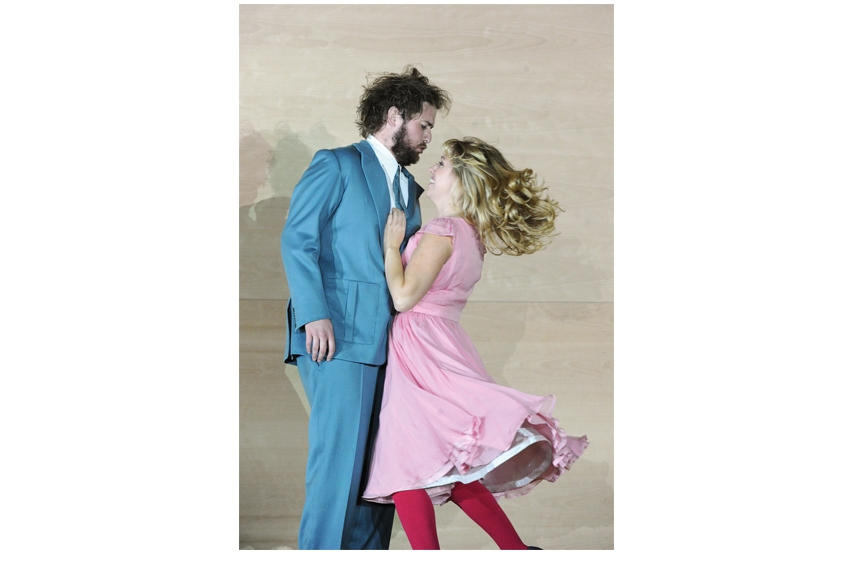Rameau is the great baroque master who has yet to be properly rediscovered, at any rate in the UK. It isn’t easy to see why, when one contemplates the Handel-mania that has been sweeping the land for the past quarter-century. Rameau is at least as melodically fertile, his scoring is extraordinary and often extraordinarily lovely, and his plots are far easier to grasp. And while Handel’s operas grind to a dramatic halt every few minutes for an extended expression of feeling, and there is only rarely the sense of interaction between characters, with Rameau we have that sense constantly.
The main trouble, I think, certainly the main trouble for me, is the fairly frequent intrusion of dance sequences, which can drain the urgency from the action with lethal efficiency. Besides that, there is the question of what kind of dance to perform. Indeed, there is the question of what style to perform the whole works in. But counterbalancing that is the fluid, flexible setting of the text, perhaps more similar to Monteverdi than to any other great opera composer, and comparable to Wagner in the sureness of its placing of climaxes, as well as in its pervasive nobility.
If there is a Rameau renaissance, ENO’s new production of Castor and Pollux may well be cited as a landmark, musically speaking. The orchestra has been raised to audience level, making an enormous difference to the quality and quantity of sound. Christian Curnyn’s conducting seems ideal, responsive to what is happening onstage, making the most of Rameau’s textures, and rhythmically buoyant. And the cast could hardly be bettered, with absolutely superb accounts of the title roles by Roderick Williams as the immortal Pollux and Allan Clayton as his mortal twin Castor. The two women Télaïre and Phébé (why aren’t the names translated?) get strong readings from Laura Tatulescu and Sophie Bevan, and the subsidiary characters are all adequate. It is a musically exalted experience, and I strongly recommend going and keeping your eyes tightly shut throughout.
For the production is a sheer disaster. Barrie Kosky, another Berlin-located Regisseur, has a solemn interview in the programme in which he states: ‘We play the whole opera as if you are not quite sure of the distinction between earth, heaven and hell, so that who knows what is being dreamed when and where. It becomes apparent that we are actually going nowhere: hell is earth, and earth is hell, and heaven is hell and it’s on earth.’ Anyone who is capable of such mumbo-jumbo should be kept well clear of an opera house, especially of ENO, where they have plenty of specialists in that already.
What we actually get onstage is incomprehensible, a mix of sprinting, groping and convulsing. Knickers play a prominent part, both tighty-whities for the men and sexy panties for the women. If you sit on the dunghill which separates earth and hell you will, with any luck, find a hand thrusting through the dung and probing you. Later on there is cross-dressing, nudity and a comprehensive abandonment of any relationship to Rameau’s work. The dance problem is solved in a variety of ways: as soon as the curtain rises, we see what appears to be a school party disco-dancing; subsequent dances are much more embarrassing than that. There is a largely excellent DVD of Castor on Opus Arte, of a production from Amsterdam which is not ideal, but far superior to this, and also is musically splendid. This Dutch performance has dignity and grace, two concepts and states unknown and unavailable to Kosky.
A few days later I saw English Touring Opera’s production of Handel’s Flavio, a revival from two years ago of one of the company’s triumphs. The stage is bare, the costumes grand and in period. It works very well, by trusting the composer. But it struck me more forcibly than usual that my main difficulty with Handel’s operas is that I don’t give a damn about any of the characters. Even when they are at their most poignant, such as Emilia’s heartbroken lament for her father at the end of Act II, one responds to the expression, as one might in an instrumental piece, rather than to the character who is having the emotion. That is one of the reasons why these operas lack, to me, dramatic impetus.
It is no reflection on ETO’s cast, which is almost uniformly of a high standard, though Clint Van Der Linde in the title role has exactly the kind of counter-tenor voice which might put one off the species for life. Flavio is poised between comedy and tragedy, but in the rather abstract way that I have indicated. What a relief, though, to see so unpretentious and unpushy a production after the latest ENO débâcle.






Comments